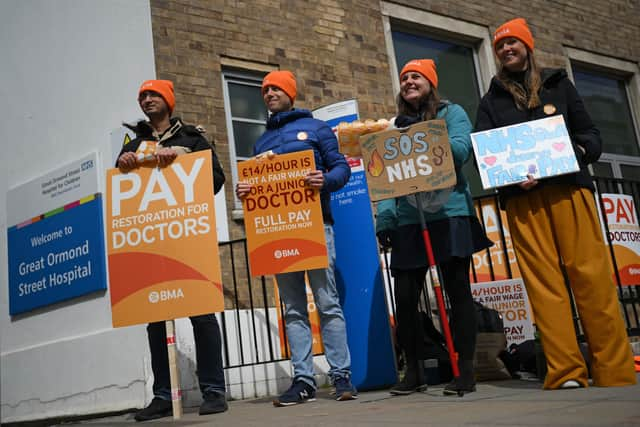Junior doctors strike; what is the difference in pay between junior doctors, specialists and NHS nurses?
People in this article
and live on Freeview channel 276
Junior doctors in England are planning to go on a five-day strike in July, marking what could be the longest single period of industrial action in the history of the National Health Service (NHS). The strike, organised by the British Medical Association (BMA), is scheduled to take place from 7 am on Thursday, July 13, until 7 am on Tuesday, July 18. The walkout is expected to disrupt thousands of appointments and pre-planned operations as more senior doctors step in to provide emergency and critical care.
The decision to strike comes after previous industrial actions by junior doctors, including a three-day strike earlier in the month, a four-day walkout in April, and a three-day one in March. The BMA states that junior doctors' pay has decreased by over a quarter since 2008 when accounting for inflation, leading to burnout among many doctors due to increased workloads. The government's offer of a 5% pay increase is considered inadequate by the BMA, which is demanding a 35% raise.
Advertisement
Hide AdAdvertisement
Hide AdThe government argues that the demanded figure is unreasonable and warns that the strikes could jeopardise patient safety and result in further treatment delays. The ongoing dispute centres on pay and non-pay issues. The prime minister's spokesperson expressed disappointment with the strike announcement and urged junior doctors to reconsider, emphasising the government's willingness to engage in discussions if the strikes are called off and if there is a willingness to find a way forward.
Junior doctors, who make up about 45% of the NHS medical workforce, are in the process of training to become specialists or general practitioners. Two-thirds of them are members of the BMA. The union revealed that over half of the surveyed junior doctors had received job advertisements from overseas recruiters, including from the government of South Australia, which has sent trucks to picket lines offering improved pay to entice NHS doctors to emigrate.
In Scotland, junior doctors also voted to strike after rejecting a pay offer from the Scottish government, while in Wales, the government has agreed in principle to pay restoration, although the specific terms have yet to be agreed upon.
What is the pay difference between junior doctors, senior doctors and nurses?


The basic salary for junior doctors starts at around £23,000 in the first year and increases to around £28,000 in the second year of training. For doctors in specialist training, the basic salary ranges between £30,000 and £47,000. The average total salary for a doctor in training, including additional payments for working extra and anti-social hours, is approximately £37,000.
Advertisement
Hide AdAdvertisement
Hide AdIn contrast, for senior doctors (including specialist roles such as anesthesiologists) the average salary for doctors in general is higher, with an average of £76,300 per year. The salary range for senior doctors in the UK can vary depending on experience and specialisation, with the highest salaries reaching up to £93,323 per year and the lowest salaries starting from £31,183 per year.
As for nurses, the salary range for nurses in the UK can be approximately £23 to £31 per hour for Registered General Nurses (RGN) working in a hospital setting, though private healthcare nurse wages can vary depending on the location and level of responsibility within the role.
Comment Guidelines
National World encourages reader discussion on our stories. User feedback, insights and back-and-forth exchanges add a rich layer of context to reporting. Please review our Community Guidelines before commenting.
